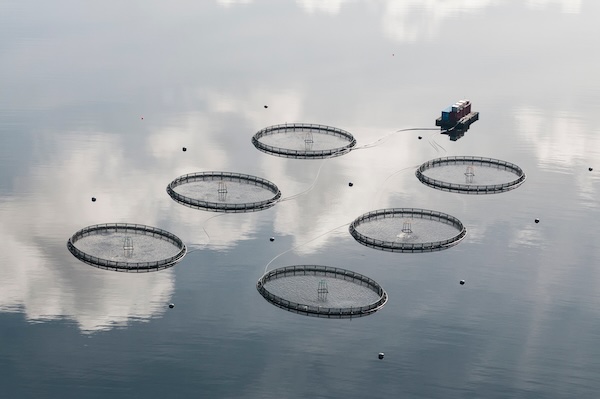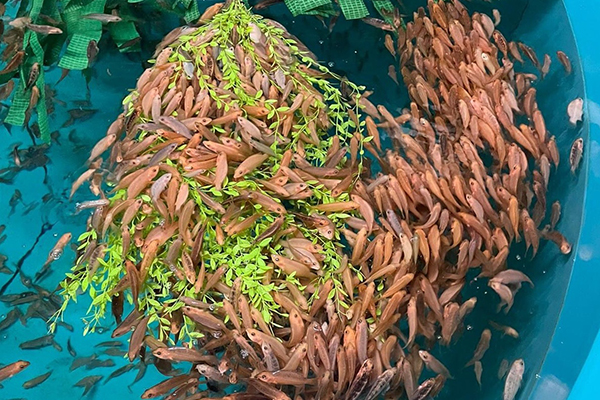Projects include monitoring for micro-jellyfish and harmful algal blooms

The Sustainable Aquaculture Innovation Centre (SAIC) has announced funding for three aquaculture projects focused on improving fish health and welfare in response to climate change and other challenges. Announced after its latest call for research initiatives, these projects are valued at £1.6 million (U.S. $2 million), with nearly £600,000 (U.S. $785,000) coming from SAIC and additional backing from businesses in the Scottish aquaculture sector.
“This funding represents a significant boost to the innovative research being conducted across Scotland’s aquaculture sector,” said Linsey Dickson, interim executive director of research, innovation and business engagement at the University of Stirling. “By applying cutting-edge technologies and evidence-based practices, these projects are poised to address some of the sector’s most pressing challenges. Close collaboration between academia and the fish farming community is crucial to ensure that our findings translate into actionable solutions that support the future of sustainable seafood production.”
Two of the funded projects are already in progress. The first project focuses on creating a holographic imaging system to detect and monitor micro-jellyfish at aquaculture sites. It will also develop an automated profiling system for harmful algal blooms (HABs) in the water, providing real-time data for effective fish health management.
The second project builds on previous SAIC-funded work that identified predictive biomarkers for gill health in Atlantic salmon. Its goal is to enhance these biomarkers using machine learning and non-invasive sampling techniques while examining their ability to predict responses to micro-jellyfish exposure and various diets.
A third project is set to launch in November, targeting stock management strategies for outbreaks of proliferative kidney disease (PKD) in Scotland. This initiative will monitor environmental conditions and fish immune responses using advanced techniques, to develop predictive models that enhance health management practices and improve vaccine efficacy in aquaculture.
The latest funding awards build on SAIC’s ongoing efforts, transforming nearly £11 million (U.S. $14.3 million) into essential research worth over £71 million (U.S. $92.9 million). These initiatives have spurred the creation of spin-out companies, new products and innovative solutions to industry challenges.
Earlier this year, SAIC announced additional funding to enhance its decade-long work. In the coming period, SAIC will focus on promoting health and welfare outcomes for farmed fish through applied research and knowledge exchange, particularly in response to emerging environmental challenges.
“Over the past ten years, we have prioritized initiatives aimed at enhancing aquaculture’s environmental impact, fish health and unlocking economic potential,” said Sarah Riddle, director of innovation and engagement at SAIC. “In this current funding call, our sharper focus aligns us even more closely with the sector’s key priorities, fostering collaboration to tackle critical health, welfare and survivability challenges in fish farming – and each of these projects aims to tackle these areas. Continued knowledge exchange between the sector and academia will also be vital in maintaining Scotland’s position at the forefront of pioneering advancements across the global aquaculture supply chain.”
Now that you've reached the end of the article ...
… please consider supporting GSA’s mission to advance responsible seafood practices through education, advocacy and third-party assurances. The Advocate aims to document the evolution of responsible seafood practices and share the expansive knowledge of our vast network of contributors.
By becoming a Global Seafood Alliance member, you’re ensuring that all of the pre-competitive work we do through member benefits, resources and events can continue. Individual membership costs just $50 a year.
Not a GSA member? Join us.
Author
Tagged With
Related Posts

Health & Welfare
Tool in development aims to improve sea lice predictions and fish health
A new tool is being developed to improve sea lice predictions and enhance fish health with more reliable, consistent data.

Health & Welfare
SAIC boosts funding for cleaner fish vaccination research
SAIC funds research to fine-tune a cleaner fish vaccination, potentially improving sea lice control in salmon farming.

Intelligence
SAIC funds sea lice vaccination technology developed by Stirling and other partners
The Sustainable Aquaculture Innovation Centre (SAIC) has awarded funding to assess the efficacy of novel sea lice vaccine technology.

Health & Welfare
SAIC is funding fish health and welfare research initiatives
SAIC has awarded $1 million in R&D support to seven innovation projects focused on fish health and welfare.



